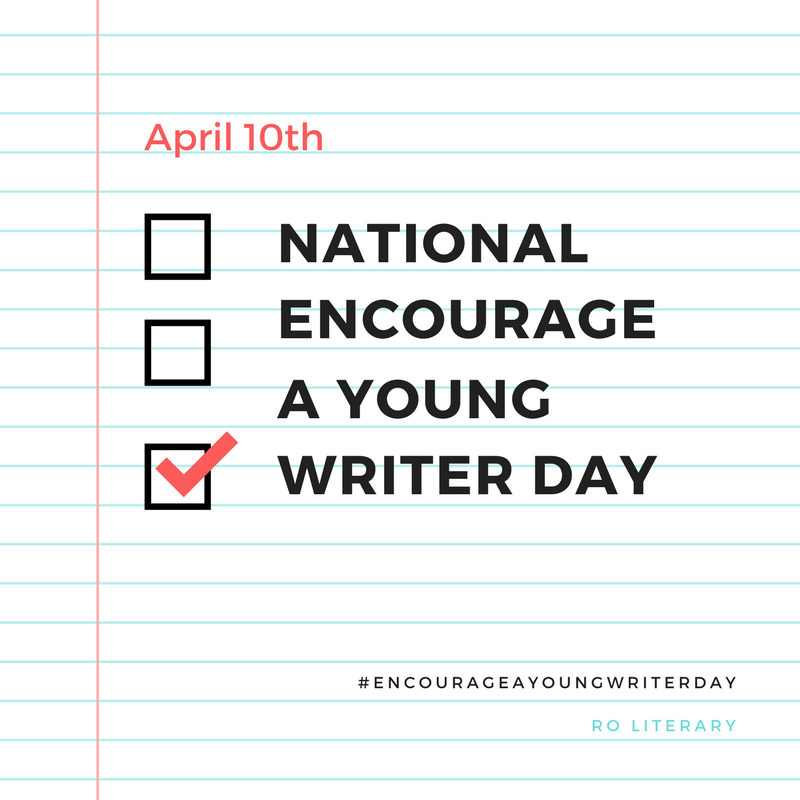In a world where teens communicate in acronyms and emoticons, and schools have replaced handwriting with keyboarding, how does one encourage young people to write beyond the LOL’s and the BFF’s and learn to love the art of writing?
April 10th is National Encourage A Young Writer Day. As a literary agent, the number one question I get asked over and over is, “How do I become a better writer?” My response is always the same, “Become a better reader.”
[bctt tweet=”When teens communicate in acronyms, how does one encourage a young writer to think beyond LOL’s and learn to love writing?” username=”ROLiterary”]
Reading is the gateway to writing. Whether you read to your child or they read to you, reading ignites the imagination and sets the foundation for the fundamentals of craft and storytelling. They will not merely see the words, learn proper grammar and vocabulary, they will hear the cadence of storytelling, feel the rhythm of inflection, learn about emotional responses and how they are articulated. Regardless of age, encourage a writer by encouraging them to be a reader.
Journaling is something that can be introduced as young as three. Encourage toddlers to create mini books of drawings that tell a short story, or express an emotion. As children learn to read and write, buy them a diary, or give them blank notebooks to journal in. Explain to them that these are private places for them to write out their emotions and experiences. When we travel, I give my children small notebooks and colorful pens to record their experiences. They always love to go back and reread their journals, reliving their adventures over and over again.
Writing and storytelling are synonymous. For many children, the physical act of writing is cumbersome. This is often one of the earliest deterrents and can seal in the frustration associated with writing and storytelling early on. However, most children are comfortable with a keyboard as young as first grade. If your child struggles with handwriting, typing may be easier and more enjoyable for them. Give them the chance to journal on a computer or Ipad. Storytelling can even be done through voice dictation. There are plenty of apps and software programs designed for this purpose. Encourage storytelling and writing will likely happen as a result.
Lead by example. If you want to encourage a young writer, don’t just tell them to write, show them writing is something worth doing. Journal with them, and let them see you reading and writing. Write thank you notes, and letters of appreciation to them. Write down short stories and memories about them from when they were an infant and share with them.

Have a family write-in night. Pick a writing prompt. Everyone can take turns either finding one on the internet or making one up. Make it fun, make it silly, make it positive! Set a timer and write. When the time is up, everyone shares their writing. Make a no criticism rule. Everyone has to point out at least one positive thing about the piece, and share what it was about it that resonated with them. No negative feedback is allowed. This will cultivate creativity and confidence, two important traits all writers need.
Write your family history together. With the ease and low cost of self-publishing these days, writing and publishing a single book can be an inexpensive endeavor. Encourage a young writer to help you transcribe stories, do family interviews, record memories under photos in a scrapbook or photo book. Help them see that stories are meant to be cherished.
Fan fiction. Pick a favorite character from a book, a movie or television show and ask a young writer to rewrite the story, change their characters fate, or reimagine the outcome or ending of the story.
Writing doesn’t have to be a full-length novel or a short story collection. It can be poetry, a card, a thank you letter to a friend or their favorite grandparent. If they have a talent or passion, encourage them to set up a blog. Avoid critiquing and editing their work. The point is to give them confidence and enjoyment from the experience of writing. Every bit of writing helps cultivate a lifelong desire to turn thoughts and feelings into words.
Give a young writer some encouragement today in person and on social media. #ENCOURAGEAYOUNGWRITERDAY
Laura Rothschild is a literary agent and the co-founder of RO Literary. Through her Draft to Done program, she works with entrepreneurs to help them turn their expertise into books that propel their businesses and speaking careers.
Connect with Laura on Twitter: @dailydosemedia





